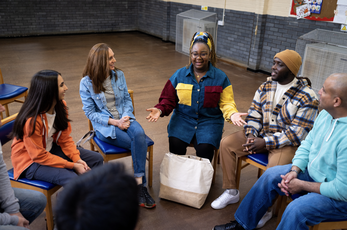Ongoing Projects
Building a Community-Based Mental Health Literacy Intervention for Black Young Adults
|
Promoting mental health literacy (MHL), defined as knowledge and beliefs related to mental health (e.g., recognition, prevention, and management of symptoms) may be an important first step to improving mental health outcomes for Black/African American young adults. As part of this study, the REACH Alliance team will partner with a Community Advisory Board to develop a community based MHL intervention, focused on trauma and substance use, for Black/African American young adults. The culturally tailored intervention will be guided by the Theory of Planned Behavior (TPB) and social ecological model as guiding frameworks, with intervention components designed to promote attitudes, norms, and beliefs related to mental health care with resources for individuals and communities. After development, the intervention will be piloted among Black/African American young adults aged 18-35 years old, recruited from diverse community sites.
Funded by National Institute of Mental Health (NIMH) Grant 1K01MH131797-01 |
Completed Projects
Exploring Mental Health Screening and Linkage to Care Among Young African American Men
Funded by National Institutes of Mental Health (NIMH) Grant 1R36 MH115722-01; the University of Missouri-Kansas City, School of Graduate Studies Research Award Program and the American Association of University Women (AAUW) of Kansas City Award
|
The major goal of this study was to qualitatively explore Theory of Planned Behavior (TPB)-related beliefs, intentions, and facilitators/barriers to seeking mental health care among young urban Black men who had experienced trauma. Participants also discussed potential community intervention strategies regarding mental health care, based on their current needs and preferences for their communities. A secondary goal was to develop and pilot a TPB-guided survey instrument among young Black men, to help researchers capture these attitudes, norms, and beliefs using questions that are culturally relevant and established through community engagement. This study was funded by an NIMH R36 grant as well as the University of Missouri-Kansas City, School of Graduate Studies Research Award Program and the American Association of University Women (AAUW) of Kansas City Award.
To read more about this study, click the link below to download our report.
| |||||||
Mental Health Beliefs and Current Needs among Young Black Women
The goal of this study was to build on our previous research, guided by the Theory of Planned Behavior, to advance understanding of the attitudes, norms, and beliefs related to seeking out mental health care among young Black women who have experienced trauma, such as interpersonal violence or sudden/unexpected loss of a loved one. Experiences like this greatly increase the risk for mental health concerns--including PTSD, depression, and problematic substance use. However, young Black men and women are less likely to receive mental health care when needed compared to white young adults, due to complex cultural, historical, and systemic barriers. By engaging directly with communities of young Black women, we hope to understand 1) how we can address these barriers using innovative, community-led strategies and 2) current needs for managing mental health, given the psychological and emotional distress caused by ongoing COVID-19 pandemic. This mixed methods study will inform development of a culturally tailored intervention to promote mental health care among young Black adults who have experienced trauma.
We are still going through all of the responses, and we will post a report of our findings soon.
We are still going through all of the responses, and we will post a report of our findings soon.
Assessing Community Needs and Preferences for Mental Health Promotion
Funded by Rutgers University Center for Youth Social Emotional Wellness (CYSEW) Mental Health Equity Summit Grant
The REACH Alliance team, in collaboration with community partners (The Urban Health Collaborative and NAMI NJ), developed a needs assessment survey for residents of New Jersey, focusing on Middlesex and Somerset counties. The needs assessment elicited community members’ interest, perceived feasibility and importance, and recommendations for mental health promotion strategies, across multiple mental health domains (e.g., stress, anxiety, depression, trauma, substance use, links to physical health). The needs assessment was conducted among an inclusive sample of Black and Latinx adults between Sept 2023 and June 2024.
We are currently analyzing the data, and we will circulate findings with community members and stakeholders soon. Reports of our findings will be made available on this page. We hope to use the findings to develop plans and establish a foundation for further community action.
We are currently analyzing the data, and we will circulate findings with community members and stakeholders soon. Reports of our findings will be made available on this page. We hope to use the findings to develop plans and establish a foundation for further community action.
African American Racial Trauma (AART) Study
Studies have demonstrated the negative health-related impacts of racism and discrimination. Over the past two decades, there has also been an increasing focus on racial discrimination as a traumatic stressor—also referred to as racial trauma. Yet, there is debate about the conceptualization of racial trauma, which may impact diagnosis and treatment for trauma-related disorders. It is critical to increase our understanding of racial discrimination in the context of multiple traumatic events, given the ongoing disparities in both general stressors and complex trauma that can impact Black communities. This study aims to examine the impact of racial trauma and racial discrimination on mental health symptoms (e.g., posttraumatic stress, depression, anxiety) among Black and African American adults, as well as exploring personal, social, and contextual influences (e.g., racial/ethnic identity, religious beliefs and behaviors, media exposure) on racial experiences and mental health.
We are still conducting data analysis, and will post a report of our findings soon.
We are still conducting data analysis, and will post a report of our findings soon.
Developing a Cultural Humility Toolkit for Mental Health Service Providers
Funded by Rutgers Inclusion, Diversity, Equity, and Advocacy (IDEA) Innovation Grant Award
|
Diverse populations, particularly people of color, are less likely to receive high-quality mental health care, in part due to racism and discrimination from providers. Cultural humility can be considered a sense of self-awareness of one's own background, and a commitment to learning about and valuing others' respective cultural backgrounds, values, and identities. Cultural humility has long been discussed in the mental health field, but questions remain on how to begin this process of self-reflection, let alone building into one's clinical practice. This project aimed to develop a resource toolkit to promote cultural humility among mental health service providers (e.g., psychiatrists, psychologists, counselors, social workers), focused on building practical skills for developing cultural humility and providers' ability to flexibly work with diverse populations and intersectional identities.
Copies of the toolkit are available under the "Resources" tab. |
Cultural Humility Among Treatment Providers (CHAT) Study
Funded by a Black Bodies, Black Health Seed Grant from the Rutgers Institute for the Study of Global Racial Justice
This project extended development of an interactive resource toolkit for mental health service providers, designed to build practical skills for developing cultural humility and providers' ability to flexibly work with diverse populations and intersectional identities. Using a mixed methods approach, this study: 1) used interviews to assess the experiences of providers from mental health agencies across the country (e.g., current methods for integrating culture in treatment, additional training needs or blockages to culturally sensitive practice), 2) conducted a survey to assess the experiences of mental health service clients (e.g., providers' strengths or perceived gaps for integrating their identity into treatment), and 3) piloted the newly developed toolkit among mental health service providers to assess acceptability, effectiveness, and recommendations for improvement. We hope to continue this work by developing a more comprehensive workshop and adapting the toolkit materials for use with medical providers and others who work with diverse communities.




